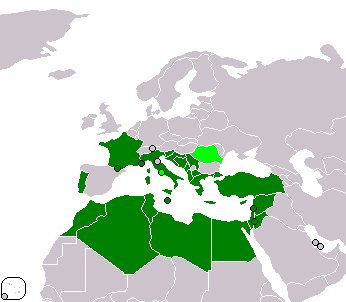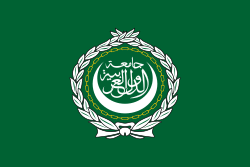Parliamentary Assembly of the Mediterranean
The Parliamentary Assembly of the Mediterranean (PAM) is an international organisation established in 2005, following fifteen years of cooperation among States of the Mediterranean region. Cooperation focused on themes of common interest, such as political, socio-economic and environmental issues. The members of this organization have discussed these issues at periodic Conferences on Security and Cooperation, the first of which was held in 1990 and developed under the auspices of the Inter-Parliamentary Union.
 | |
| Abbreviation | PAM |
|---|---|
| Formation | 2005 |
| Type | International organization |
| Headquarters | Naples, Italy |
| Location |
|
Membership | 29 member parliaments |
| Website | |
The PAM was originally headquartered in Malta, in recognition of Malta's strategic role and commitment in organizing the PAM.[1][2] The new headquarters is located in Naples, Italy.
Objectives

The main objective of PAM is to forge political, economic and social cooperation among the member states in order to find common solutions to the challenges facing the region, and to create a space for peace and prosperity for the Mediterranean peoples.
PAM's membership is open exclusively to Mediterranean countries, which are represented on equal footing. This is reflected in the composition of the Bureau and the alternating Presidency. The current President of PAM is António PEDRO ROQUE da Visitação Oliveira of Portugal.[3] Each national delegation has five members with equal voting and decision-making powers. Associate Members and Observers do not have voting rights.
PAM conducts the bulk of its work within three standing committees. The standing committees focus on three strategic areas; the first standing committee is dedicated to political and security cooperation, the second is focused on economic, social and environmental issues, while the third standing committee addresses dialogue amongst civilisations and human rights issues. The PAM may also set up ad hoc committees or special task forces for particular topics, such as the Middle East, migration, free trade, terrorism, climate change, and others.
Secretariat
The Secretariat assists the PAM President, the PAM Bureau and all members in the execution of their mandate, and is responsible for providing coordination. assistance, and support to the work of the Committees and all other bodies established under PAM.
The Secretariat interacts with national delegations, as well as with regional and international bodies sharing an interest in the Mediterranean region. It stimulates the activities of the Assembly, and awards the PAM Prize, dedicated to individuals or institutions whose work is considered important for the Mediterranean region. The Secretary-General, assisted by international and local staff, directs the Secretariat. Ambassador Sergio Piazzi is the current Secretary-General.
Relations with non-Mediterranean countries and international institutions
The membership criteria and geographical location of its members position PAM as a central actor in the Mediterranean region.
The General Assembly of the United Nations granted observer status to the Parliamentary Assembly of the Mediterranean, by the Resolution A/RES/64/124, at its 64th Session on 16 December 2009.
Local parliamentarians are key to political decision-making processes within the PAM. In furtherance of its objectives, PAM encourages the inter-governmental support of the main actors in the region as well as regional institutions.
Membership

As of 2020 there are 29 member parliaments, 7 associate and partners states and organizations and 13 observer organizations.[4]
Member states
Associate and partner states and organizations
Observers
- Arab Inter-parliamentary Union
- Preparatory Commission for the Comprehensive Nuclear-Test-Ban Treaty Organization
- Euro-Mediterranean University of Slovenia
- Fondazione Mediterraneo

- Maghreb Consultative Council of the Arab Maghreb Union
- Mediterranean Citizens Assembly Foundation
- Mediterranean Energy Regulators (MEDREG)
- Parliamentary Assembly of the Union for the Mediterranean
- Parliamentary Assembly of the Organisation of the Black Sea Economic Cooperation
- Organization of Islamic Cooperation

- World Meteorological Organisation
Cooperation with other organizations
In addition to the above, PAM also cooperates (to various degrees) with other international organizations, including the:
References
- "Malta and Gozo".
- "PALAZZO SPINOLA - PAM HQ INAUGURATION". Parliamentary Assembly of the Mediterranean. pam.int. 22 November 2007. Retrieved 10 August 2016.
- http://www.pam.int/welcome.asp?m=assembly&id=309
- "List by National Delegation, Associate Members and Observers". Assemblée Parlementaire de la Méditerranée. Retrieved 19 March 2020.
- "PAM and Arab Parliament Presidents sign MoU in Cairo". Parliamentary Assembly of the Mediterranean. Retrieved 19 March 2020.
- "PAM and the Council of Europe's Member Parliaments to strengthen further cooperation". Parliamentary Assembly of the Mediterranean. Retrieved 19 March 2020.
- "PAM and EBRD MoU formalizes collaboration between the two institutions". Parliamentary Assembly of the Mediterranean. Retrieved 19 March 2020.
- "PAM-EIB MoU signed in Monaco - "New form of integration in the Mediterranean required" - EIB Vice-President". Parliamentary Assembly of the Mediterranean. Retrieved 19 March 2020.
- "HISTORY OF THE IAO". Interparliamentary Assembly on Orthodoxy. Retrieved 2020-01-07.
- "Foreign Terrorist Fighters: A challenging phenomenon for the Euro-Mediterranean and CIS regions". Assemblée Parlementaire de la Méditerranée. Retrieved 19 March 2020.
